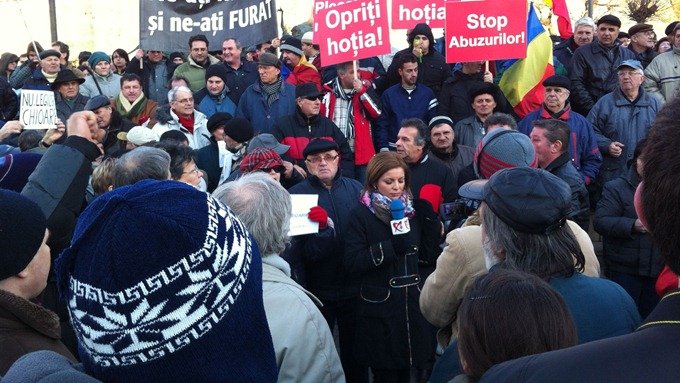Thousands of Romanians in Bucharest and other cities staged a third straight day of protests on Saturday, as anger over a healthcare reform bill widened into protest against government austerity measures.
More than 1,000 protesters rallied in Bucharest’s main University Square, blocking traffic. After seven hours, they refused to leave, and scuffled several times with riot police who then used tear gas.
Five police officers sustained injuries after they were hit by stones, local media reports said. The ambulance service said more than 20 people had been treated for injuries. Protesters yelled anti-government slogans and called for early elections. 29 protesters have been arrested, according to riot police.

The government pulled its draft healthcare reform bill on Friday after street protests and criticism, but that has failed to assuage the anger of crowds, who called on Saturday for early elections and the resignation of President Traian Basescu.
Protesters chanted and carried banners that said “Stop thievery”, “You lied to us and robbed us” and “Leave and let us be”. Some scuffled with riot police in the capital.
“It is important for protesters to understand that we are not against them, we are here to protect them and … make sure the law is respected,” said Georgian Enache, spokesman for Bucharest riot police, who added he didn’t have estimates as to how many protesters had gathered in downtown Bucharest.
Protests started on Thursday in support of Deputy Health Minister Raed Arafat, who resigned this week after criticizing the draft healthcare reform bill and being confronted by President Traian Basescu, a supporter of the project.
Traian Basescu told Romania’s centrist coalition government to pull the bill late on Friday. Opponents said the bill lacked detail on private sector involvement and risked further damaging the outdated medical system.
Saturday’s protests expanded from support for Raed Arafat to general discontent with the government’s unpopular austerity measures, taken under an aid deal led by the International Monetary Fund to shore up public finances and prop up the leu currency. In 2010, the government cut salaries in the public sector by 25 percent and raised other taxes.
[youtube fWNcFfeqvQI]
[youtube Dkt66WDOBJg]
